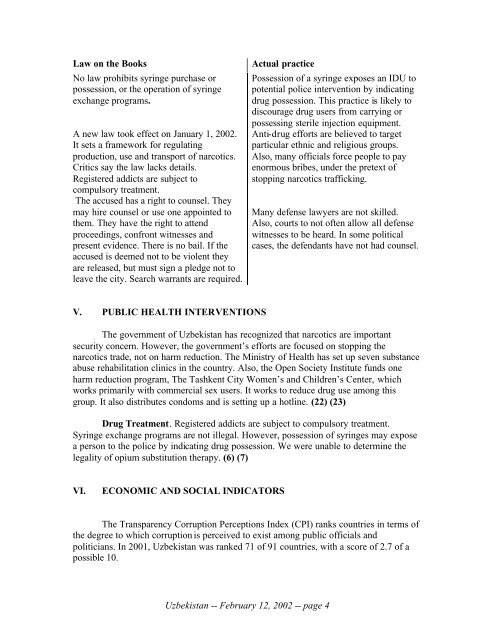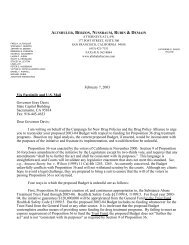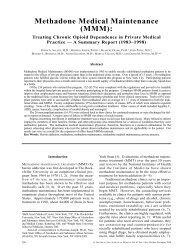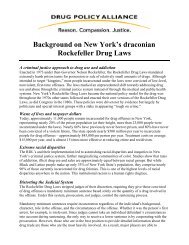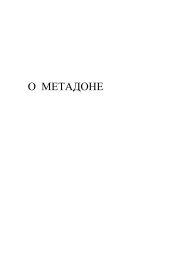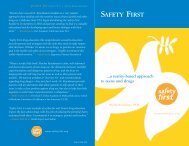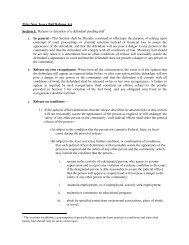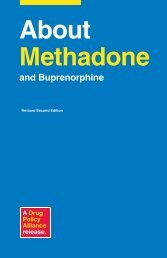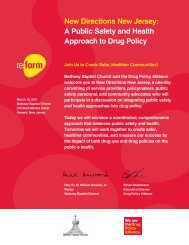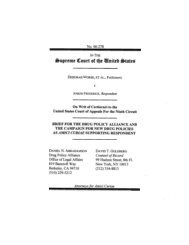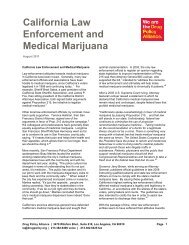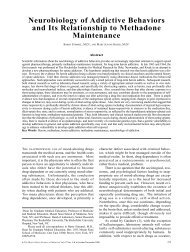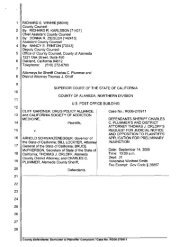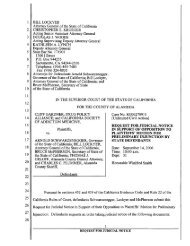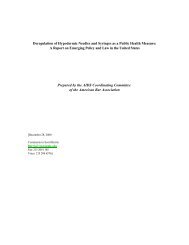Drug Policy and Health In Uzbekistan - Drug Policy Alliance
Drug Policy and Health In Uzbekistan - Drug Policy Alliance
Drug Policy and Health In Uzbekistan - Drug Policy Alliance
Create successful ePaper yourself
Turn your PDF publications into a flip-book with our unique Google optimized e-Paper software.
Law on the Books<br />
No law prohibits syringe purchase or<br />
possession, or the operation of syringe<br />
exchange programs.<br />
A new law took effect on January 1, 2002.<br />
It sets a framework for regulating<br />
production, use <strong>and</strong> transport of narcotics.<br />
Critics say the law lacks details.<br />
Registered addicts are subject to<br />
compulsory treatment.<br />
The accused has a right to counsel. They<br />
may hire counsel or use one appointed to<br />
them. They have the right to attend<br />
proceedings, confront witnesses <strong>and</strong><br />
present evidence. There is no bail. If the<br />
accused is deemed not to be violent they<br />
are released, but must sign a pledge not to<br />
leave the city. Search warrants are required.<br />
Actual practice<br />
Possession of a syringe exposes an IDU to<br />
potential police intervention by indicating<br />
drug possession. This practice is likely to<br />
discourage drug users from carrying or<br />
possessing sterile injection equipment.<br />
Anti-drug efforts are believed to target<br />
particular ethnic <strong>and</strong> religious groups.<br />
Also, many officials force people to pay<br />
enormous bribes, under the pretext of<br />
stopping narcotics trafficking.<br />
Many defense lawyers are not skilled.<br />
Also, courts to not often allow all defense<br />
witnesses to be heard. <strong>In</strong> some political<br />
cases, the defendants have not had counsel.<br />
V. PUBLIC HEALTH INTERVENTIONS<br />
The government of <strong>Uzbekistan</strong> has recognized that narcotics are important<br />
security concern. However, the government’s efforts are focused on stopping the<br />
narcotics trade, not on harm reduction. The Ministry of <strong>Health</strong> has set up seven substance<br />
abuse rehabilitation clinics in the country. Also, the Open Society <strong>In</strong>stitute funds one<br />
harm reduction program, The Tashkent City Women’s <strong>and</strong> Children’s Center, which<br />
works primarily with commercial sex users. It works to reduce drug use among this<br />
group. It also distributes condoms <strong>and</strong> is setting up a hotline. (22) (23)<br />
<strong>Drug</strong> Treatment. Registered addicts are subject to compulsory treatment.<br />
Syringe exchange programs are not illegal. However, possession of syringes may expose<br />
a person to the police by indicating drug possession. We were unable to determine the<br />
legality of opium substitution therapy. (6) (7)<br />
VI.<br />
ECONOMIC AND SOCIAL INDICATORS<br />
The Transparency Corruption Perceptions <strong>In</strong>dex (CPI) ranks countries in terms of<br />
the degree to which corruption is perceived to exist among public officials <strong>and</strong><br />
politicians. <strong>In</strong> 2001, <strong>Uzbekistan</strong> was ranked 71 of 91 countries, with a score of 2.7 of a<br />
possible 10.<br />
<strong>Uzbekistan</strong> -- February 12, 2002 -- page 4


